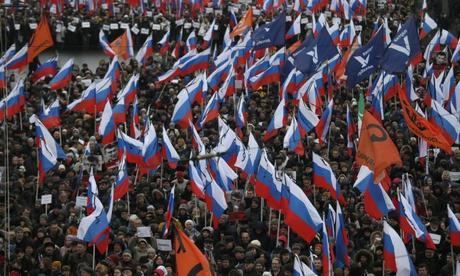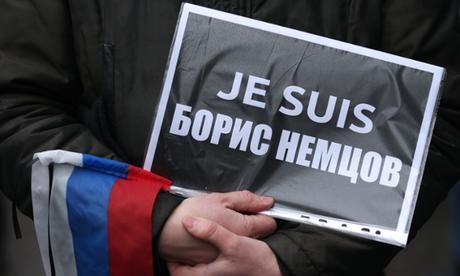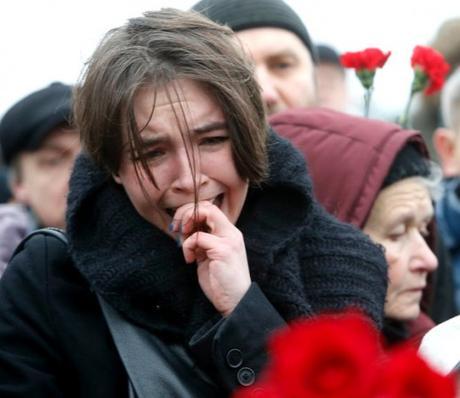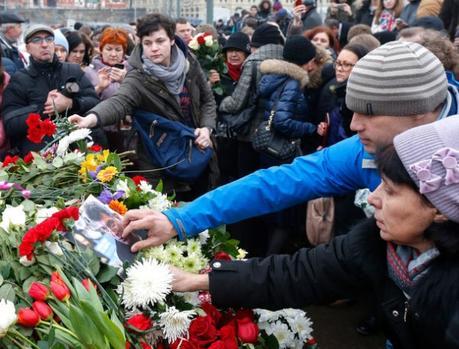Thousands of people take to the streets in memory of the former deputy prime minister and vehement critic of Vladimir Putin.

About two weeks before he was shot and killed in the highest-profile political assassination in Russia in a decade, Boris Y. Nemtsov met with an old friend to discuss his latest research into what he said was dissembling and misdeeds in the Kremlin.
He was, as always, pugilistic and excited, saying he wanted to publish the research in a pamphlet to be called "Putin and the War," about President Vladimir V. Putin and Russian involvement in the Ukraine conflict, recalled Yevgenia Albats, the editor of New Times magazine. Both knew the stakes.
Mr. Nemtsov, a former deputy prime minister, knew his work was dangerous but tried to convince her that, as a former high official in the Kremlin, he enjoyed immunity, Ms. Albats said.
"He was afraid of being killed," Ms. Albats said. "And he was trying to convince himself, and me, they wouldn't touch him because he was a member of the Russian government, a vice premier, and they wouldn't want to create a precedent. Because as he said, one time the power will change hands in Russia again, and those who served Putin wouldn't want to create this precedent."
This is a video of Boris Nemtsov's last televised interview, given hours before being shot dead.


On Saturday, it was still not clear who was responsible for killing Mr. Nemtsov. Some critics of the Kremlin accused the security services of responsibility, while others floated the idea of rogue Russian nationalists on the loose in Moscow.
The authorities said they were investigating several theories about the crime, some immediately scorned as improbable, including the possibility that fellow members of the opposition had killed Mr. Nemtsov to create a martyr. Mr. Putin, for his part, vowed in a letter to Mr. Nemtsov's mother to bring to justice those responsible.
As supporters of Mr. Nemtsov laid flowers on the sidewalk where he was shot and killed late Friday, a shiver of fear moved through the political opposition in Moscow.
The worry was that the killing would become a pivot point toward a revival of lethal violence among the leadership elite in Moscow and an intensified climate of fear in Russian domestic politics.
"Another terrible page has been turned in our history," Mikhail B. Khodorkovsky, the exiled former political prisoner, wrote in a statement about the killing.
"For more than a year now, the television screens have been flooded with pure hate for us," he wrote of the opposition to Mr. Putin. "And now everyone from the blogger at his apartment desk to President Putin, himself, is searching for enemies, accusing one another of provocation. What is wrong with us?"
Vladimir Milov, a former deputy minister of energy, and co-author with Mr. Nemtsov of pamphlets alleging corruption in Mr. Putin's government, said he was concerned that the state could now target former officials like Mr. Nemtsov - or like him - deemed disloyal.
This comes as analysts of Russian politics say the Kremlin could be worried about, and intent on discouraging, further defections to the opposition, given reported high-level schisms between hard-liners and liberals over military and economic policy. The government is already under strain from Russia's unacknowledged involvement in the war in Ukraine and runaway inflation in an economic crisis.
Mr. Milov posted an online statement saying, "There is ever less doubt that the state is behind the murder of Boris Nemtsov," and that the intention was to revive a culture of fear in Moscow. "The motive was to sow fear," he wrote.
Irina Khakamada, a former member of Parliament, suggested in an interview with Snob magazine that splinter groups in the security service intent on retaining Soviet practices, or "radical frozen ones, who think anything is allowed," could be to blame.
Russian authorities said on Saturday that one line of investigation would be to examine whether Mr. Nemtsov, a 55-year-old former first deputy prime minister and longtime leader of the opposition, had become a "sacrificial victim" to rally support for opponents of the government, the Investigative Committee of the Prosecutor General's Office said in a statement.
The statement, the fullest official response so far to Mr. Nemtsov's killing, said the police were pursuing half a dozen leads in the case, the highest-profile assassination in Russia during the tenure of Mr. Putin.
The committee also cited the possibility that Islamic extremists had killed Mr. Nemtsov over his position on the Charlie Hebdo shootings in Paris, saying that security forces had been aware of threats against him from Islamist militants. The committee also said that "radical personalities" on one or another side of the Ukrainian conflict might have been responsible. The statement said the police were also considering possible business or personal disputes as motives.
"The investigation is considering several versions," the statements said. The first it listed was: "a murder as a provocation to destabilize the political situation in the country, where the figure of Nemtsov could have become a sort of sacrificial victim for those who stop at nothing to achieve their political goals."
This explanation echoed and elaborated on a statement posted overnight on the Kremlin website, which also characterized the murder as a "provocation."
"The president noted that this cruel murder has all the signs of a contract killing and carries an exclusively provocative character," the Kremlin statement said. "Vladimir Putin expressed his deep condolences to the relatives and loved ones of Boris Nemtsov, who died tragically."
Mr. Putin, in a message to Mr. Nemtsov's mother released by the Kremlin, said, "Everything will be done so that the organizers and perpetrators of a vile and cynical murder get the punishment they deserve."
Initially, Russian news media reported Mr. Nemtsov had been shot from a passing car. On Saturday, however, a television channel, TVTs, broadcast a surveillance video purporting to show the murder, though from a distance. Mr. Nemtsov had left a restaurant in the GUM shopping center on Red Square and was walking with his girlfriend, Anna Duritskaya, a Ukrainian model.
A snowplow blocked the scene. But the video, which has not been independently verified, appears to show the shooter was hiding on a stairway on Moskvoretsky Bridge waiting for Mr. Nemtsov and Ms. Duritskaya to pass. Later, the figure of the supposed shooter runs to a getaway car that pulls up on the bridge.
After laying flowers on a floral mound already chest high and kneeling in respect before the blooms festooning the sidewalk on a rainy, glum midafternoon, Anatoly Chubais, a co-founder with Mr. Nemtsov of the Union of Right Forces political party, scorned the investigators' claim.
"Today, we had a statement that the liberal opposition organized the killing," he said. "Before this, they wrote that the liberals created the economic crisis. In this country, we have created demand for anger and hate."
Ilya Yashin, a political ally of Mr. Nemtsov's, drew attention again to the pamphlet Mr. Nemtsov was preparing on Russian military aid to pro-Russian rebels in Ukraine. Speaking on the Echo of Moscow radio station, he said Mr. Nemtsov had "some materials that directly proved" the participation of the Russian army in the Donbas war in Ukraine.
Mr. Yashin said he knew no details, or what had become of those materials.
Ms. Albats, who had discussed with Mr. Nemtsov his unfinished exposé, said of this state of affairs in domestic Russian politics, "We are at war now."
"Those who are believers in democracy, those who for some reason, back in the late 1980s, got on board this train, and had all these hopes and aspirations," she said, "they are at war today."

